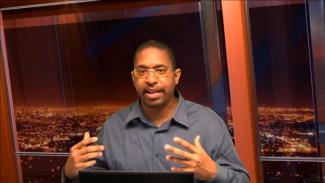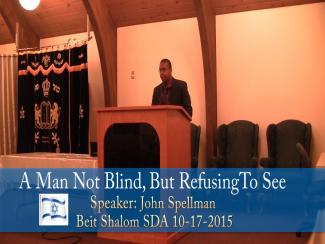Jeremiah brought a message of rebuke to the people of Judah. Because this was not a popular message, he met a lot of opposition. As people planned to do him harm God was with him to deliver him. Why did so many reject the warnings of the prophet? How does this still happen, even in our time today? Why were people more willing to listen to false prophets? If God hadn't sent them, who did? Why was Jeremiah told not to pray for the people? Are there limitations to God's mercy? If so, what happens when those limits have been reached? Is repentance always genuine?
Topic: The Prophets
To see more broadcasts select show names, a year, or all video media.Who were the last five kings of Judah? How did God reach out to them? What was there response to the message of Jeremiah the prophet and God's Word? What lessons can we draw from this for our time today? What made many of the kings of Judah so stubborn? How was Josiah's reign different? What did Josiah do during his reign that contrasted the other kings and what message does that hold politicians in today's time? In this lesson we cover Josiah, Jehoahaz, Jehoiakim, Jehoiachin, and Zedekiah. We explore the events that led to the Babylonian captivity and the parallels with today.
Why is humanity in crisis? How does this crisis impact the lives of God's people? In what way did Jeremiah face this crisis in his time? How does this relate to challenges the church faces from both the secular world and within the church itself? In what ways can challenges from within be worse than challenges without? In what ways did the history of Israel and Judah show crisis from within? Why did God punish His chosen people through other nations? What was God trying to teach them? As we explore the book of Jeremiah, we will see how many things parallel today.
This week we start a new quarter on the book of Jeremiah the Prophet. How was this prophet called? What can we know about his background and ministry? What exactly is a prophet's job? What kinds of messages does God send through prophets? How does God communicate with prophets? Are they always willing to accept the call? Will people readily accept their message? In what way was Jeremiah's experience similar to that of Jesus? This week we take our first look at Jeremiah.
What can we learn about missionary activity from the story of Jonah? What kind of missionary was Jonah and how did he respond to his calling? Do missionaries have flaws? What does God's pursuit of Jonah tell us about salvation and who God desires to save? Why was Jonah reluctant to go to Nineveh? In what ways are we very similar in attitude to Jonah? This week we explore the story of Jonah from a missionary standpoint and learn how God shows compassion on the repentant and how His judgments are conditional.
In the story of Namaan and his leprosy, who was the unlikely missionary? What can we learn about salvation and outreach from this example? Why does Elisha have Namaan dip in the Jordan River 7 times? How does this story portray faith, obedience, and transformation? What did being saved by grace mean for Namaan and how did he respond to God's grace? What are the prerequisites for seeing the mighty works of God? This week we explore the little that is said about an unlikely missionary that had a huge impact on Namaan and his encounter with Elisha.
This week we discuss the last book of the Old testament. Several questions are addressed. Does God love on person and hate another? Was Esau destined for failure? Is it really possible for a person to rob God? Should we give God the best or worst of what we have? This study also discusses God's love and His faithful relationship with His people.
Does God withhold blessings from people when He is not put first? What are some of the ways we don't put God first in our lives? In this week's study, John Spellman and Joseph Williams explore the return of God's people from captivity as they rebuild their own homes and leave God's temple in ruins. What was significant about the temple being left in ruins? What does God being "with us" really mean?
This week's study explores Zechariah 1-4 and each of the visions Zechariah has in those chapters. We will explore God's forgiveness and mercy. What does God mean by being "Jealous for Jerusalem"? Why was the angel of the Lord displeased by the nations being settled and at ease? What promises did God make to His people that still apply to us today? What was the true meaning behind the vision of Joshua the High Priest standing before the angel in filthy garments? How does this apply to us today? What was the vision of the lampstand with the seven golden lamps about?
Continuing the series on the minor prophets, John Spellman explores the prophet Zephaniah in this week's lesson. This study focuses on the "Day of the Lord". Is this day a day for everyone to look forward to? What does it mean to "Seek the Lord"? Why is it necessary for a loving God to judge? How does corruption among God's people spread so quickly? What is God's promise in spite of His divine judgment? Does God God really know how to sing? These questions are explored in this week's lesson.












